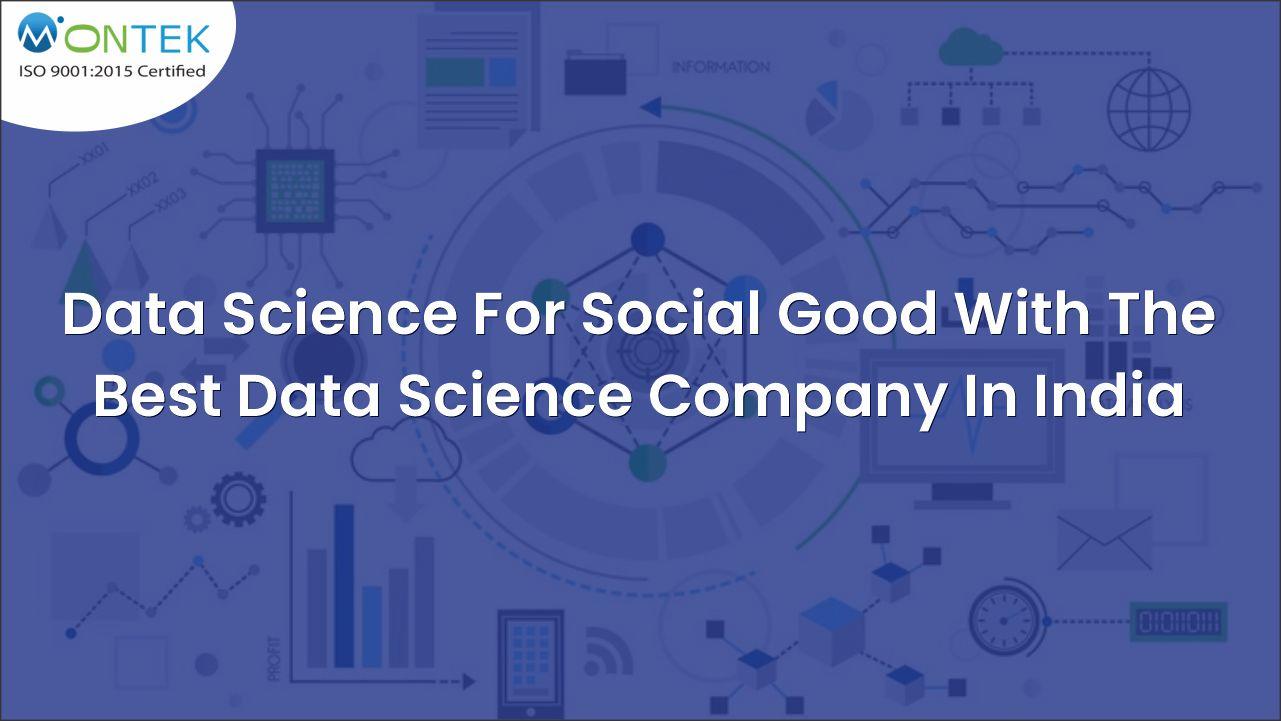
15
FebData Science for Social Good with the Best Data Science Company In India
In an era marked by technological advancements, data science services have enabled data to emerge as a powerful tool not only for business growth but also for driving positive social change. The field of data science has extended its reach beyond profit-driven endeavors to address pressing social and humanitarian challenges.
In this blog, we explore the inspiring realm of data science for social good, highlighting how analytics is being leveraged to create meaningful and lasting positive impacts on society.
The Convergence of Data Science and Social Impact :
Data science for social service involves applying data analytics, machine learning, and predictive modeling to tackle social, environmental, and humanitarian issues. By harnessing the power of data, organizations and individuals can make more informed decisions, allocate resources efficiently, and design effective interventions.
Key Areas of Data Science for Social Service :
Data science's impact on social good is felt across a range of domains:
1. Healthcare and Public Health :
Predictive models analyze health data to forecast disease outbreaks, allocate medical resources, and improve patient outcomes.
2. Education :
Datadriven insights help identify at-risk students, personalize learning experiences, and optimize educational programs.
3. Humanitarian Aid and Disaster Response :
Data analytics aid in disaster risk assessment, emergency response coordination, and the allocation of aid resources.
4. Environmental Conservation :
Data science is used to monitor and predict environmental changes, protect endangered species, and guide sustainable resource management.
5. Poverty Alleviation :
Analytics inform poverty mapping, social welfare program targeting, and microfinance initiatives.
6. Criminal Justice Reform :
Datadriven approaches help reduce biases in the criminal justice system, optimize law enforcement strategies, and enhance community safety.
Real-World Examples: Making a Difference with Data Science :
1. Predictive Policing :
Law enforcement agencies use predictive analytics to identify highrisk areas for criminal activity, enabling targeted interventions to prevent crime.
2. Disaster Response :
During natural disasters, data science assists in predicting the path and impact of events, aiding timely evacuations and resource allocation.
3. Healthcare :
Datadriven healthcare initiatives help detect disease outbreaks, optimize patient care pathways, and predict patient readmissions.
4. Poverty Mapping :
Geotagged data is analyzed to map poverty distribution, aiding policymakers in targeting poverty reduction efforts.
The Ethical and Responsible Use of Data :
While data science for social service holds immense potential, it comes with ethical considerations:
1. Privacy :
Ensuring data privacy and consent are crucial when using sensitive information for social good initiatives.
2. Bias and Fairness :
Data-driven solutions must be designed to avoid reinforcing or amplifying existing biases and inequalities.
3. Transparency :
Transparency in data collection, analysis, and decision-making processes is vital to maintain trust.
4. Accountability :
Organizations must be accountable for the impact of their data-driven initiatives and address any unintended consequences.
The Future of Data Science for Social Service :
As data science continues to advance, its potential for social good is boundless. Improved algorithms, increased availability of data, and enhanced computational power will drive even more innovative solutions to address complex societal challenges.
Harnessing Data for a Better Future
Data science services for social good exemplify the transformative power of technology in creating positive change. By leveraging data-driven insights, organizations and individuals can make more informed decisions, develop targeted interventions, and drive tangible improvements in various facets of society. As the field of data science services evolves, its role in social good endeavors will only expand, paving the way for a future where analytics is a force for positive transformation and lasting impact.
Ready to make a difference?
Partner with, Montek Services the best data science company in India for impactful data-driven solutions. Explore how analytics can drive positive change and create a better future.
Contact Montek Services today to embark on your journey of social good through data science.
Author -

Software Engineer

